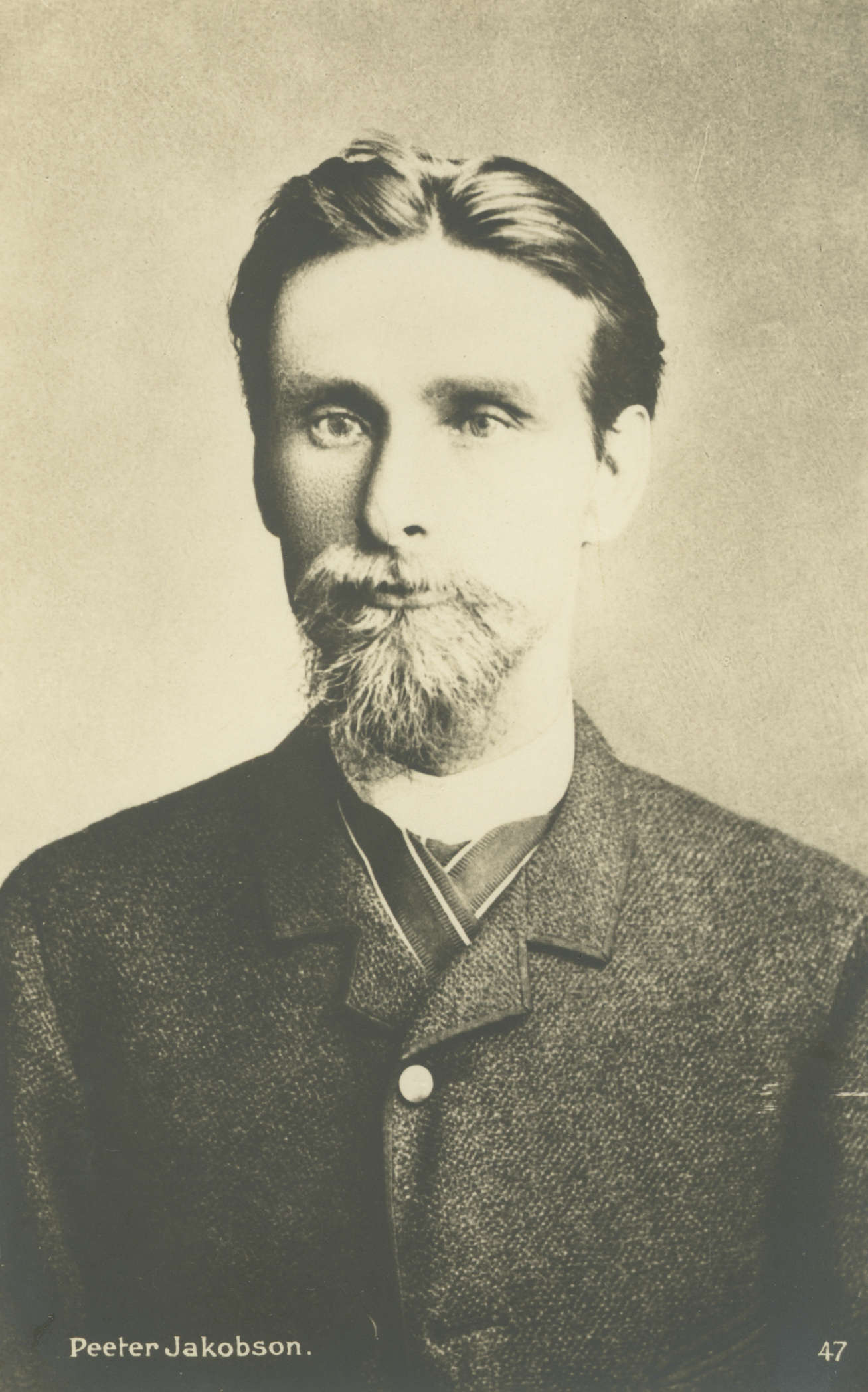
Peeter Jakobson
Peeter Jakobson (27/15 December 1854 – 23/11 July 1899) was a poet and playwright.
Jakobson was born in Rakvere as the son of a shoemaker. He attended the Russian church school and the school for the poor. From 1875–1879, Jakobson served in the Russian army, from 1877, as a non-commissioned officer in the Russian-Turkish War on the Balkan Peninsula. In 1879, he was released from service because of illness and started working as a shoemaker in Rakvere, from 1884 at Väike-Maarja where he later founded a bookshop. Thereafter, he worked as a parish clerk at Põdrangu and Koonu-Ärina and in the 1890s as a photographer at Väike-Maarja.
Along with Kaarel Krimm and Jakob Liiv, Peeter Jakobson was a member of the “Väike-Maarja Literary Parnassus” and participated in the activities of cultural societies. He published three volumes of poetry in Estonian and a selection in German, Die Hirtenflöte aus dem estnischen Blumenthal (‘The Shepherd Flute from the Estonian Valley of Flowers’, 1895) which contains his translations of his own and his contemporaries’ poetry into German. In 1886–1899, he published nearly 300 poems in the newspapers Postimees, Valgus, Virulane and Sakala.
The themes of Jakobson’s poems are unpretentious, and the manner of presentation is simple and sincere. The author has put his war experiences into poetry. Along with romantic tones, his later poetry includes realist elements. Jakobson has written a few poems for children, the best-known of them is Vastla laul (‘Shrove Tuesday Song’).
Peeter Jakobson has written two sentimental plays with pseudomythological characters: Koit ja Hämarik (‘Dawn and Sunset’) and Udumäe kuningas ehk kroonitud woorus (‘Fog Hill King or Crowned Virtue’). These plays achieved popularity on stage and had an impact on Estonian literature. Jakobson also wrote village comedies on temperance themes Kustas kosib Mihklit (‘Kustas is Wooing Mihkel’) and Kihlakaart ehk suured sekeldused (‘Engagement Card or Great Confusion’), the psychological drama Pettuse ohvrid (‘Victims of Deceit’) and a few short plays.
He has published short prose about the Balkan countries and everyday scenes about life in the homeland. Peeter Jakobson’s memoirs Minu sõjamälestused (‘My War Memories’) appeared posthumously in 1901.
Jakobson has compiled a history book for schools, Ajalugu Eesti alamatele koolidele (‘History for Lower Estonian Schools’) and manuals of manners for young people. He has translated German literature into Estonian, including Friedrich Schiller’s play Salakavalus ja armastus (‘Intrigue and Love’, Ger Kabale und Liebe).
L. P. (Translated by I. A.)
Books in Estonian
Poetry
Õilme nupukesed: Laulud noore rahwalle. Rakvere: G. Kuhs, 1881. 48 lk.
P. Jakobson’i Luuletused. Esimene anne. Rakwere: G. Kuhs, 1884. 46 lk.
P. Jakobson’i Luuletused. Teine anne. Rakwere: G. Kuhs, 1885. 63 lk.
Plays
Koit ja Hämarik: Rahwaluulelik näitemäng kahes pildis. Rakvere: G. Kuhs, 1884. 16 lk.
Udumäe kuningas ehk kroonitud woorus: Näitelaul neljas järgus. Tartu: Eesti Kirjameeste Selts, 1888. 113 lk.
Kustas kosib Mihklit: Naljamäng kolmes järgus. Viljandi: A. Peet, 1895. 31 lk.
Pettuse ohwrid: Kurbmäng neljas järgus. Jurjev: K. A. Hermann, 1897. 99 lk.
Kihlakaart, ehk, Suured sekeldused: Naljamäng kahes järgus. Jurjew: M. Vares, 1899. 43 lk.
Karukütt: Näitemäng ühes järgus, kahes muutuses. Jurjew: E. J. Õunapuu, 1900. 30 lk.
Stories
Ööwahi tütar. Tallinn: A. E. Brandt, 1882. 88 lk.
Ta on tulnud!. Jurjev: Uus Aeg, 1899. 56 lk.
Memoirs
Minu sõjamälestused. Tallinn: G. Pihlaka rmtkpl., 1901. 44 lk. [Vene-Türgi sõjast 1877–1878.]
Miscellaneous
Kirjakirjutaja ehk juhatus, kuidawiisi tuleb mitmesugusi kirjasi, kontrahtisi, kwitungisi, wõla- ja wolikirjasi, testamentisi, wekslisi ja rehnungisi kirjutada. Rakvere: G. Kuhs, 1883. 123 lk.
Mõistlik seltsiline: Noore rahwalle õpetlikuks ajawiiteks ja juhatuseks seltsilikus elus. Rakvere: G. Kuhs, 1883. 63 lk.
Mitmesugused armastuse kirjad ja wastused: Juhatus noore rahwalle armastuse ja kosja asjus. Rakvere: G. Kuhs, 1884. 44 lk.
Ajalugu Eesti alamatele koolidelle. Rakvere: G. Kuhs, 1885. 126 lk.
Books in German
Poetry
Die Hirtenflöte aus dem estnischen Blumenthal: Gedichte: Aus dem Estnischen übersetzt P. Jakobson. Wesenberg, 1895. 95 lk.



